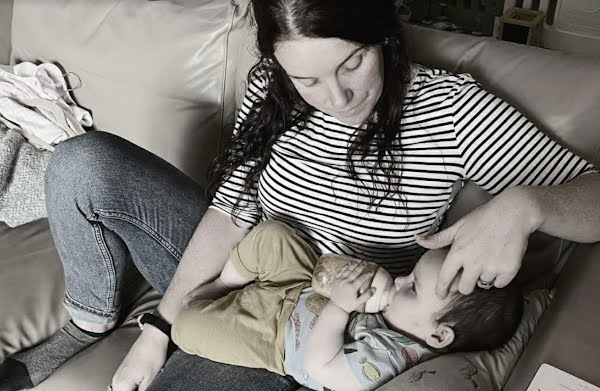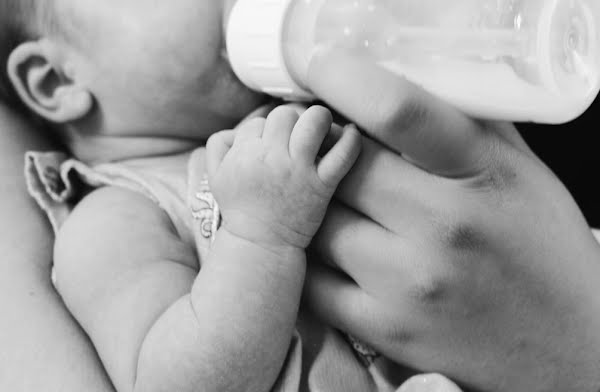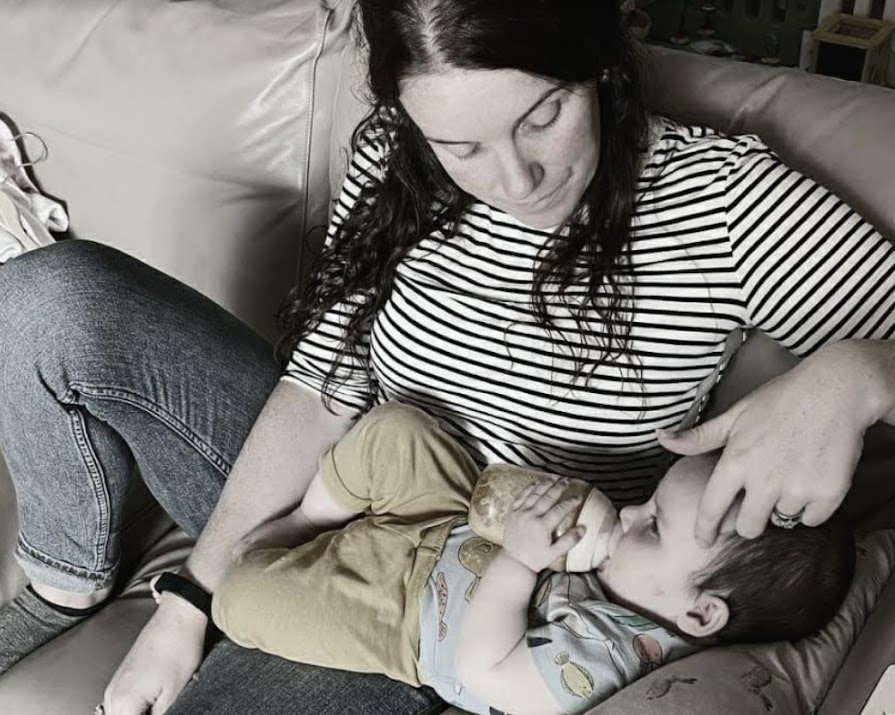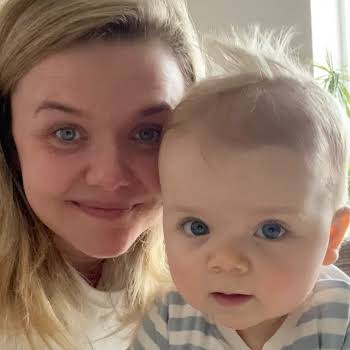‘What message are we sending bottle-feeding families when we place formula in the same retail category as cigarettes?’
By Dr Clare Moriarty
14th Aug 2021
14th Aug 2021
Dr Clare Moriarty, mum and Trinity academic, says she's probably not alone in finding the “breastfeeding is the best start in life for your baby” disclaimer opening for all TV ads, patronising. She asks if perhaps this preachy paternalism has something to do with baby-feeding being regarded as primarily a women’s health issue?
I have a powerful memory of first reflecting on Irish breastfeeding politics.
I was 20 and visiting a then-new American coffee chain that had arrived on my local main street. Amid trying to figure out which series of words they wanted me to say to produce what was erstwhile obtainable as a “large black coffee” I noticed something unusual about the setting: the café had a disproportionate number of tables filled with women with babies.

At one table of four, two women were in different stages of openly breastfeeding babies and chatting. Initially—in line with my Irishness—I looked away, embarrassed by the possibility of a tiny amount of nudity. And then, thinking about how nice it was that Ireland—the Ireland of the Magdalene laundries, Mother and Baby homes and no divorce until the mid-1990s—had, at least in this leafy suburb, reached a place where some women felt at peace having a breast, or part of a breast, out at work in public. I thought about what a marker of spiritual growth this represented for the country and did my best to offer what I’m sure was an awkward and possibly creepy “good on you” smile in their general direction.

I think that it’s wonderful that we have come to a place where breastfeeding in public can be a more relaxed part of family life. We have National Breastfeeding Week, an annual ‘Latching On’ ceremony, Breastival, and increasingly, parental leave contracts include special provisions to support breastfeeding women returning to work. I don’t doubt that we still have far to go and that many still face difficult choices and anxiety in their infants’ journeys to solid food, but I’m hopeful that the promised land on that front is much closer than it has ever been, and, is approaching with ever-greater haste.
“I’m probably not alone in finding the “breastfeeding is the best start in life for your baby” disclaimer opening all TV ads for “follow-on” milk products patronising and tiresome”
A Controversial Formula
These improvements for breastfeeding parents have not sprung from nowhere. Governing bodies at various levels have implemented policies aimed at increasing national breastfeeding figures because Ireland’s rates are low when compared with socioeconomically similar countries. This push towards breastfeeding has, in my view, had some negative consequences for people who formula feed.
Having read what I can only describe as a bizarre and frustrating characterisation of the current situation by Sabina Higgins, as a research academic, I feel somewhat compelled to say a few words about some of this mythos. I am also a new mother, at great peace with a choice I made early on about feeding my daughter and frequently flabbergasted by the rhetoric I find in the literature and advice on feeding infants.
Nuance Needed
Deciding how to feed a baby involves consideration of at least two parties: the feeder(s) and the fed. In both cases, there is a tendency to overstate and under-complicate the benefits of breastfeeding. Parenting happens in vastly different ways in different families, and this is to be celebrated. My experience is in a family with two parents and one baby, but much of it by no means depends on that arrangement.
A confusion looms in much of the reporting of findings on breastfeeding and its alleged benefits. Emily Oster (professor of health economics at Brown University and arguably the most trusted analyst of statistics on pregnancy and parenthood) concluded on the basis of her analysis of the relevant scientific studies, that breastfeeding boasts the following benefits: it helps digestion in a baby’s first year, prevents certain rashes, and is particularly beneficial for premature babies.
This probably sounds modest compared to the claims you’ve doubtless heard if you are expecting or a parent. Anecdotally, in my antenatal class, I was told breast milk was “magic”, that it would give my baby a higher IQ, and that it “prevents cancers”.

Social advantage?
The reason for the disparity between Oster’s conservative findings and the typical claims is that breastfeeding rates vary dramatically over social class. In Ireland, as in most developed countries, breastfeeding mothers are on average considerably better off and have received more formal education than their formula-feeding peers. This complicates things hugely because social class and education are extremely influential factors in determining your prospects in an unequal society (the average dying age of British royal family members are a sobering reminder of the impact of wealth on health).
So, when advocates cite links between breastfeeding and, say, higher IQ or lower obesity rates, we must ask, “is it the breastfeeding or the general social advantage more likely to be doing the work?” The benefits, Oster advises, are those that are not better explained by general social advantage. And breastfeeding may do many things, but it won’t change your social or educational status.
Slightly better digestion, rash-resistance and the needs of premature babies are important considerations, and whatever we might think of the specifics of Oster’s analysis, we need to be cautious in our interpretations of correlations between breastfeeding and desirable outcomes, because these associations are frequently used to make extraordinary claims that are not actually backed up by the studies. For the same reasons, one could make amazing claims for the benefits of diamond-ownership on children’s prospects if correlations were all that was necessary.
“We should support it by making breastfeeding easier for people, not by making the formula experience worse”
Messaging
My Irish pregnancy experience was very light on this kind of caution. In what might be understood as a well-intentioned push to overcome the past stigma around breastfeeding, a kind of coercive moral and medical certainty seems to have emerged. It’s it’s which all advocacy of breastfeeding is hinged.
Presumably, advocates feel that the strongest case for increased supports for breastfeeding families is hinged on the premise that such support is bolstering an obviously superior option, because, as a society, we are more willing to provide funding for essentials than preferences. Whereas, we should support breastfeeding because it’s something that many Irish families want to do. And, we should support it by making breastfeeding easier for people, not by making the formula experience worse. The sense that formula-feeding is an inadequate alternative is never more clear when one tries to get helpful information about it.
Acknowledging, as we must, that breastfeeding is simply not an option for every family, consider the impact of the following messaging on certain groups; Women who have tried and failed to breastfeed, families comprising only fathers, and, the general majority of Irish families whose children are, for whatever reason, not breastfed. This is the top of the HSE’s page for ‘Preparing baby formula’. Remember—this is not a general ‘feeding your baby’ page—this is the page people navigate to when trying to prepare a bottle of formula correctly.

Doesn’t this seem like overkill? Should someone trying to feed their baby correctly be reminded of the HSE’s disapproval of their unnatural choice? Again, bear in mind the people for whom an inability to make breastfeeding work has been deeply painful. Stranger still, the HSE’s page for ‘Types of Formula Milk’ begins like this:

Again, this is the HSE’s ‘Types of Formula Milk’ page, where the likely readers are those trying to prepare formula for a child. How should we interpret this third sentence except as claiming that the “special ingredients” in breast milk are vital (yes, VITAL) for normal growth, development and good health?
The clear implication here is that in failing to give a baby breastmilk, you are depriving the baby of something vital (definition: “essential, necessary”) for normal functioning. Are the formula-fed majority of people in this country abnormally developed? It shouldn’t be surprising to learn that the information that breastfed babies need to be given an additional supplement of Vitamin D (which is included in formula) is presented in a very different spirit, And, frankly, we can see echoes of this same naturalistic overkill in the following spooky rhetoric from Sabina Higgins recently.
“We human beings, as top of the chain of life, have in our personal preferences played no small role in insulting Mother Nature by ignoring her gift to us”
Chastising
“The HSE’s informational pages should not begin with a chastising (and, indeed, misleading) scolding of formula feeding parents before they learn how to make up the food”
Aside from the misleading nature of these sentiments, a serious educational issue looms large. Many problems associated with formula-feeding arise because of improper formula preparation (e.g. inadequate sterilization, failure to make the mixture up in the correct quantities etc). If so, then the HSE’s informational pages should not begin with a chastising (and, indeed, misleading) scolding of formula feeding parents before they learn how to make up the food. Chastising and misleading commentary do not encourage effective learning, and one could be forgiven for reading the above HSE content on how breastmilk is vital for their newborn’s normal development, rolling their eyes, and going to look for value-neutral information elsewhere.
It should go without saying that, as a society, we should arrange things so that people can trust the medical advice of our main provider of public health information.
And it’s not just the HSE. A friend recently recommended a popular Instagram account of an Irish Public Health Nurse and Lactation consultant. The ‘stories’ segment on ‘Formula Prep’ opens as follows: “Going to chat about a bit of a controversial topic”. That controversial topic is … explaining how to make up a bottle. A natural first reaction is to think “pull yourself together,” but having looked at blogs focused on feeding babies, I understand perfectly why someone would feel the need to say this.
If advice about preparing formula is controversial, what’s the conservative alternative? Refuse to explain the process and make it difficult for anyone to quit breastfeeding, no matter how unsuccessfully it is going?
This issue makes people behave appallingly. Of course, as a lactation consultant and breastfeeding expert, a person can and should express their preference, but what message is sent by these kinds of disclaimers from public health professionals? It seems to license the most incendiary reactions to this very normal way of feeding a child and suggest that an acceptable way to convince people to breastfeed is to leave open an information vacuum so wide that people feel they have no choice. If advice about preparing formula is controversial, what’s the conservative alternative? Refuse to explain the process and make it difficult for anyone to quit breastfeeding, no matter how unsuccessfully it is going?
Disclaimers
One would be forgiven for thinking the topic was giving a baby a bottle filled with brandy. In navigating health advice on formula-feeding, I’ve often needed to remind myself that the first person to give my daughter formula was operating on the instructions of a consultant neonatologist in the NICU.
“It’s hard not to suspect that this kind of preachy paternalism has something to do with baby-feeding being regarded as primarily a women’s health issue”
In commercial contexts, similar overkill abounds. Formula is not eligible for value club schemes like those in Boots, Tesco, etc… This places it in the same esteemed category as cigarettes and lottery tickets. I shouldn’t have to explain why this is offensive. Equally, I’m probably not alone in finding the “breastfeeding is the best start in life for your baby” disclaimer opening all TV ads for “follow-on” milk products patronising and tiresome. One such ad continues with “if you decide to move on…” (“IF”? Are we now advocating eternal breastfeeding?). When compared to the immeasurably subtler disclaimers on ads for alcohol (alcoholism being an actual menace to this country) and gambling (arguably just never a great idea), the comparatively dramatic measures imposed on formula sales and advertising are insulting.
Preachy
Ultimately, we are freely consenting to a culture of rhetoric and incentives around breastfeeding that are inadequately well-supported by the evidence to justify the extent of the dogma. And, we do so at the expense of vulnerable new parents, and often, women in precarious postnatal mental health scenarios who do not need to have a perceived failure (by choice or by chance) to overachieve in this first test of parenthood relentlessly shoved down their throats by the HSE and healthcare advisors. It’s hard not to suspect that this kind of preachy paternalism has something to do with baby-feeding being regarded as primarily a women’s health issue.
I’m beyond frustrated by the narrative that the only factor to be considered in what Higgins called our “pathetically low” breastfeeding rates is that we lack sufficient “public awareness”.
It’s an obvious point that formula-feeding facilitates an easier distribution of labour in the often-exhausting work of nourishing infants. And yet, there is so much more to say here: it’s not simply about dividing work but also about sharing an important formative experience. Feeding a child is an especially intimate part of parenting.

For me, it’s a joyful event that begins with play at the changing table, is punctuated by the misery of bib application (my daughter hates bibs) and terminates in a meaningful exchange of glances while a happy guzzling baby stares up at me. On especially good days, it requires some eye-contact avoidance, so that she’ll focus on feeding instead of smirking. We are told (by breastfeeding advocates) that feeding is important for bonding between mother and child, and, for what it’s worth, a 2019 study found no meaningful difference between breast and bottle feeding for this bonding – it’s the feeding that matters, not the method.
Bonds
“Feeding a baby (however you do it) is a lovely thing – it’s not the kind of thing that should require a HSE scolding at the outset”
Indeed, feeding can be a wonderful little routine and I have to say I am glad that my husband is so frequently my daughter’s primary partner in it. As a couple, we were in the fairly typical position of people in this country where one parent has access to 6 months leave (with additional unpaid options), and the other gets 2 weeks. We both wanted to have as equal a role in her early life as possible, given how much the harsh distribution of parental leave was going to tilt that formative quality time in my favour.
The result of our shared feeding of our daughter is that my husband is no worse than I am at feeding and settling our baby. And this is because he is almost no less practiced in it. Of course, families who breastfeed exclusively can also share the labour, but it’s hard to avoid the fact that, usually, breastmilk has to come from one person, so, a bottle given by someone else was still initially filled by the lactating parent. Additionally, there’s nothing wrong with one person assuming full (or almost full) control of feeding, but there’s also something to be celebrated in the sharing of this special experience with someone you wish to have an equal bond with your child that formula-feeding can facilitate.
Of course, there are many ways to bond with a child, but feeding and soothing a child is a considerable part of the interaction early on, and I’m glad we shared it equally and did it similarly. Feeding a baby (however, you do it) is a lovely thing – it’s not the kind of thing that should require a HSE scolding at the outset.
Balance
Another advantage that formula-feeding conferred on our situation was the capacity for unplanned relief. While I had maternity leave, the complexities of academia meant I still had to work fairly often. This meant I was scheduled to chair a live evening event watched by 1000 people when my daughter was just 5 weeks old. In a gesture that required no planning at all, my husband offered to do all feeding the night before so that I could be well-rested. He also took her for the duration of the event and put her to bed. With bottle-feeding, someone else taking over feeding can be spontaneous and doesn’t require any planning or work on my behalf. It also helped when I had to undergo a medical procedure as a consequence of a rough childbirth.
“For people who want to mix early parenting with some work and socialising, formula makes it possible without any planning or additional energy”
I even managed a dinner out with friends in the tiny quarantine window over Christmas—at last minute notice, I spent 5 blissful hours eating (then drinking) and laughing with friends. For people who want to mix early parenting with some work and socialising, formula makes it possible without any planning or additional energy.
Support
Both systems have advantages and disadvantages that will make them better or worse choices for different families. The important thing to stress here is that breastfeeding and formula-feeding families should support one another, and health infrastructure should support both, but this is too often not the case. Where two options A and B are popular alternatives for the same process, we must remember that maligning and shaming option B is not the same as supporting option A. It’s right to discuss how best we as a society can support breastfeeding families.
It’s particularly important in light of a troubling historical legacy here that has included shaming and misinformation around breastfeeding. However, it’s a dismal attempt at making option A easier that chooses, instead of finding resources for A, to make B look so bad an option that the avoidance of stigma and hassle implied by doing B becomes a person’s best reason for pursuing option A.
My frustration over this climate crystalised on a walk with a friend recently. Responding to my rant about the blacklisting of formula for Boots Advantage points, she said “I don’t know. We have to do something about our terrible breastfeeding figures.” And that’s just it; we don’t. We have a moral obligation to make sure that the reason our breastfeeding rates are low is not that families who want to breastfeed are not managing to make it work for them because of a lack of support and resources. However, if the majority of Irish families continue to choose to bottle-feed their babies, people bemoaning our “pathetic levels” are just going to have to come to terms with that.
Finally, it’s worth asking how much is too much to ask of parents? If a robust study came out that said the children of full-time mothers were likely to be (let’s say) 15% happier in their twenties, would we try to coerce mothers out of the workforce? Or vice versa for a study on working parents—would we force full-time parents out the door? I hope not.
We have to ask: how much doing what is not comfortable for us is it acceptable to normalise? And, we have to trust our judgement. I’m a working mother, and if the data showed me marginally better outcomes for my child if I stayed home, I would have to weigh that potential benefit against the consequences of my own likely misery. I adore my daughter, but I love my work too, and I know myself well enough to know that whatever the hypothetical benefits of ending my career (for this example), they would need to be assessed against what I know about myself – that I cannot give myself fully and devotionally to any of my relationships when I’m unhappy.
Don’t get me wrong, I’m not so practical that I consider myself above the over-achieving option. As anyone who knows me can attest, I’ve spent basically every free moment since giving birth knitting tiny, painstaking garments for my daughter so she can walk around in clothes that I lovingly hand-made for her. The parental desire to “do the most” is not lost on me.
“What message we send the majority of our families when we place baby formula in the same commercial category as cigarettes?”
We decided to formula-feed because we wanted our parenting to look as equal as possible to our daughter in her infancy. Of course, things are not even – the disparity in parental leave allocations makes it impossible. However, we have tried to organise this one aspect of our parenting so that this difference doesn’t trump our desire that our daughter see us both as equal nurturers (in this one respect) in her formative months.
Pathetic?
The HSE should re-think its presentation of information about formula, and some attempt at balance in the presentation of the options in ante-natal classes would better serve a population who, for whatever reasons, often choose to formula-feed rather than breastfeed. As a society, we should also think about what message we send the majority of our families (and particularly, as is statistically the case, families operating on a lower income) when we place baby formula in the same commercial category as cigarettes. I pledge to increase my commitment to efforts pursuing improved breastfeeding resources and I hope other formula-feeding families will do the same.
In turn, it would be a welcome kindness if those promoting breastfeeding would avoid indulging a rhetoric that contributes to a culture of regarding education about formula as “controversial” and refers to the statistical outcomes of choices like my family’s as “pathetic”.























